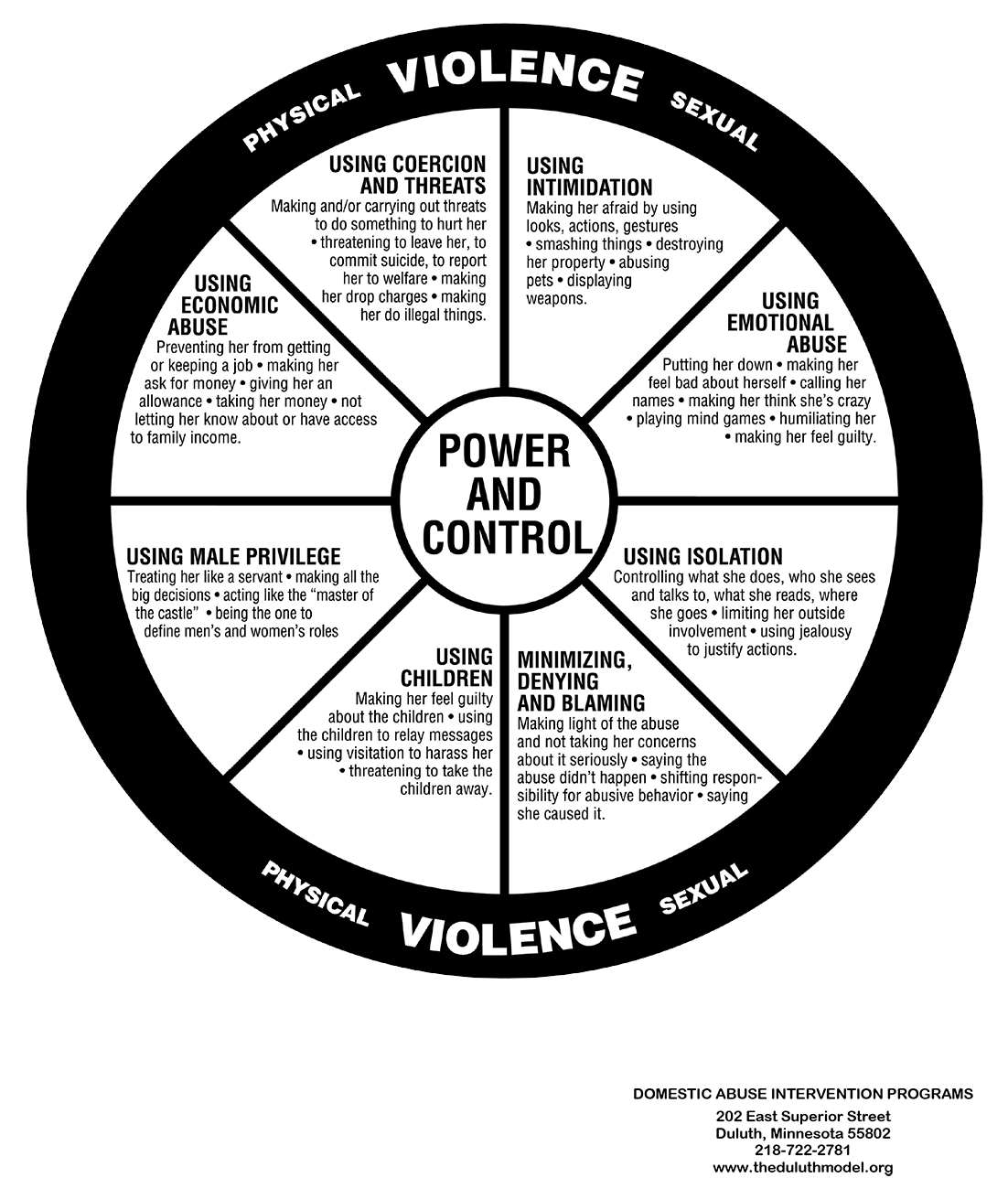What is Domestic Violence?
According to the National Domestic Violence Hotline organization, domestic violence, also called intimate partner violence (IPV), domestic abuse or relationship abuse is a pattern of behaviors used by one partner to maintain power and control over another partner in an intimate relationship. Domestic violence does not discriminate. Anyone of any race, age, sexual orientation, religion or gender can be a victim – or perpetrator – of domestic violence. It can happen to people who are married, living together or who are dating. It affects people of all socioeconomic backgrounds and education levels.
Relationship violence is a combination of a number of different tactics of abuse that are used to maintain power and control — which are the words in the center of the Power and Control Wheel (see below). The center is surrounded by different sets of behaviors that an abusive partner uses in order to maintain this power and control.
These sets of behaviors are:
Coercion and threats
Intimidation
Emotional abuse
Isolation
Minimizing, denying and blaming
Using children
Economic Abuse
Using Privilege
A lot of these behaviors can feel subtle and normal — often unrecognizable until you look at the wheel in this way. Many of these can be happening at any one time, all as a way to enforce power within the relationship.


The National Coalition Against Domestic Violence has reported the following statistics:
Nearly 20 people per minute are physically abused by an intimate partner in the United States, which equates to more than 10 million women and men each year.
One in four women and one in seven men have been victims of severe physical violence by an intimate partner in their lifetime.
There are more than 20,000 phone calls placed to domestic violence hotlines nationwide on a typical day.
One in fifteen children are exposed to intimate partner violence each year, and 90% of these children are eyewitnesses to this violence.
Nearly three women are murdered every day in the United States by current or former romantic partners, according to the Violence Policy Center.
In 2012, for the third year in a row and 5th in the previous 6 years, Nevada ranked first in the nation in the rate of women killed by men according to the annual report
When Men Murder Women. It further details the top 10 states in 2010 (FBI homicide report) with highest rates of females murdered by males: Nevada ranked #1, 2.62 per 100,000. In 2010, the year of Bee’s death, 1,800 females were murdered by males nationwide.
2
2 When Men Murder Women: An Analysis of 2010 Homicide Data
For immediate help, Dial 911, if you or anyone you know are experiencing domestic violence.
National Domestic Violence Resources
The National Domestic Violence Hotline
Advocates are available 24/7 in more than 200 languages.
All calls are free and confidential.
P.O. Box 161810
Austin, TX 78716
1-800-799-SAFE (7233)
www.thehotline.org
The National Coalition Against Domestic Violence (NCADV)
The NCADV is the voice of victims and survivors. They are the catalyst for changing society to have zero tolerance for domestic violence.
One Broadway, Suite B210
Denver, CO 80203
303-839-1852
www.ncadv.org
Local Resources and Services in Washington, DC and Maryland
Anxious 2 Resilient Group Coaching
- • Journey with your tribe
- • A Mindset reset
- • Reduce overwhelm
- • Increase self-confidence
- • Manage your anxiety
- • Increased emotional control
- • Express Your voice with self- assuredness
- • Break through limiting beliefs
- • Improve self-worth
- • Increase collaboration and networking ability
- • Improve overall life satisfaction
Phone: 410-914-7749
http://www.twannacarter.com/anxious-2-resilient/
Email: twanna@twannacarter.com
ANXIOUS 2 RESILIENT is giving back for each enrollment in the Anxious 2 Resilient program, a donation of $50 to Bee Fabulous Moments, Incorporated. This donation helps to support women and their families build or rebuild their lives.
Washington DC Metropolitan Police Department Domestic Violence Resources
Metropolitan Police Department members assist crime victims by providing them with information about their rights and available programs and services that can help them cope with physical injury, emotional trauma, and economic loss.
300 Indiana Avenue, NW, Room 5059
Washington, D.C. 20001
Phone: 202-727-9099
https://mpdc.dc.gov/page/victim-assistance
Prince George’s County Family Justice Center (PGCFJC)
The PGCFJC provides a full array of co-located services for survivors of domestic violence, sexual assault, human trafficking and elder abuse.
14757 Main Street
Upper Marlboro, MD 20772
301-870-8008
https://princegeorgescourts.org/358/Prince-Georges-County-Family-Justice-Cen
Maryland Network Against Domestic Violence (MNADV)
The MNADV promotes awareness and prevention of domestic violence by providing a statewide Helpline for survivors. Also provides a listing of all organizations providing comprehensive services for domestic violence.
4601 Presidents Dr., Ste. 370
Lanham, MD 20706
Hotline:
1-800-634-3577
Office:
301-429-3601
www.mnadv.org
Charles County, Maryland – Maryland Courts Family Services Programs/Domestic Violence Unit
The goal of the family service programs within the circuit courts is to provide an effective approach for the early resolution of family conflict. Because the courts sometimes function as "trauma centers," serving families in crisis, they are in a unique position to identify problems, and connect families who seek court intervention with much-needed services.
P.O. Box 3000
La Plata, MD 20646
301-932-3072
https://mdcourts.gov/clerks/charles/family




